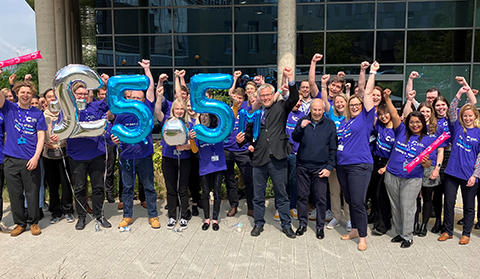Boost for cancer patients as Clinical Trials Unit receives millions

The search for new cancer treatments in Southampton has been given a multi-million-pound boost providing hope for people diagnosed with the disease.
Cancer Research UK is to invest £5.5m over the next five years at the Southampton Clinical Trials Unit (SCTU) to run world-leading trials which test new cancer treatments and help find ways to diagnose the disease at an earlier stage.
The ground-breaking Southampton Clinical Trials Unit, based at Southampton General Hospital, comprises a team of expert clinical trialists who work with doctors, scientists and patient representatives across the UK. Together they design, run and evaluate trials of new treatments, medical interventions and diagnostic tools to create the evidence that they should be standard of care for future patients in the NHS.
Over the last five years of CRUK funding, the Southampton Clinical Trials Unit, which is co-hosted by the University of Southampton and University Hospitals Southampton NHS Foundation Trust, has overseen many trials, some of which have led to practice-changing results.
Director of the Southampton Clinical Trials Unit, Prof Gareth Griffiths said: “Clinical trials are a vital part of bringing new treatments to patients and detecting cancer earlier.
“We already have a huge amount of expertise in running complex clinical trials, including first-in-human trials of new treatments, large-scale trials testing the latest drugs against current standard of care treatment, and trialling new ways to detect cancer at an early stage when it is more treatable and patients are more likely to survive.
“We look very closely at the cancer samples of our clinical trial patients in the laboratory to understand how, why and which patients benefit the most from the treatments, which helps us to design the next clinical trials where treatments are personalised for the patient. This funding will allow us to expand our ground-breaking work into more cancer types, facilitate new treatment trials and ways to diagnosis cancer earlier for patients in and across the UK.”
In 2021, the results of the CONFIRM trial showed that an immunotherapy drug was beneficial for patients with mesothelioma - an aggressive and incurable cancer often linked to breathing in asbestos. It was the first trial of its kind to show an improved outcome for these patients when first-line chemotherapy had not been successful and is now being offered to patients in the NHS.
The ProCAID trial showed that adding a targeted cancer drug to chemotherapy treatment can improve survival for patients with advanced prostate cancer.
Patient Ivan Symonds, from Southsea, who took part in the study said: “I realise the importance of research. It’s absolutely vital, we’ve got to keep researching.”
The retired engineer, 84, was diagnosed in 2012 after going to the GP with concerns about his health. He said: “I had in my mind that there was a problem, so when they told me I had cancer and explained what was involved to treat it, I’d come to the conclusion that I had to have it done and that’s it.”
Ivan was initially given standard treatment, but when this stopped working, he was invited to take part in the Cancer Research UK supported trial at University Hospital Southampton.
Ivan said: “Nature was taking me over and the cancer was growing again and that’s when Dr Simon Crabb said there was a trial and asked if I was prepared to take part in it. I said, ‘Yes of course I am, I want to survive.’ So, I signed up for the trial. It worked for me and will hopefully benefit other patients in the future.
“I take my hat off to the researchers and the clinical trial teams. Trials like ProCAID are vital to add to the science of cancer treatment and are therefore incredibly important to patients like me.”
The long-term results of another trial that was run by the Southampton Clinical Trials Unit for people with an aggressive form of lymphoma were recently presented at an international conference and again showed improved outcomes for some groups of patients.
Both ProCAID and the lymphoma studies have led to larger trials that could lead to new and better treatment being given to future patients in the NHS.
Meanwhile, an award-winning collaboration between the Southampton Clinical Trials Unit, the Southampton Experimental Cancer Medicine Centre, the NHS Lung Health Checks and industry partners in a 7000 participants study, is close to completion. It is testing new ways to diagnose lung cancer in its early stages and will provide insights into whether a simple blood test could allow doctors to detect lung cancer early and therefore increase the effectiveness of treatments.
One in two people in the UK will be diagnosed with cancer within our lifetimes so finding new effective treatments is vital.
Cancer Research UK has been integral in aiding the discovery of many new cancer treatments.
Executive Director of Research and Innovation at Cancer Research UK, Dr Iain Foulkes, said: “We are delighted to announce funding for the Southampton Clinical Trials Unit (SCTU) in Southampton, bringing together vast medical and scientific expertise to translate the latest scientific discoveries from the lab into the clinic.
"The unit is already helping to find the cancer treatments of the future, proving opportunities for patients around the UK to participate in research and advance progress.
“Trials taking place now are not only helping patients today but are providing the best possible chance of beating cancer for the next generation as well.”
Vice President (research and enterprise) at the University of Southampton, Professor Mark Spearing said: "Southampton has a long history of bringing cancer research out of the laboratory and into the clinic, improving the way patients are treated across the UK. Clinical trials are a vital part of this research process.
“We are proud to receive this new funding, which is a testament to the ground-breaking work taking place with our partners and will enable us to increase our research capacity and capability in the coming years.”